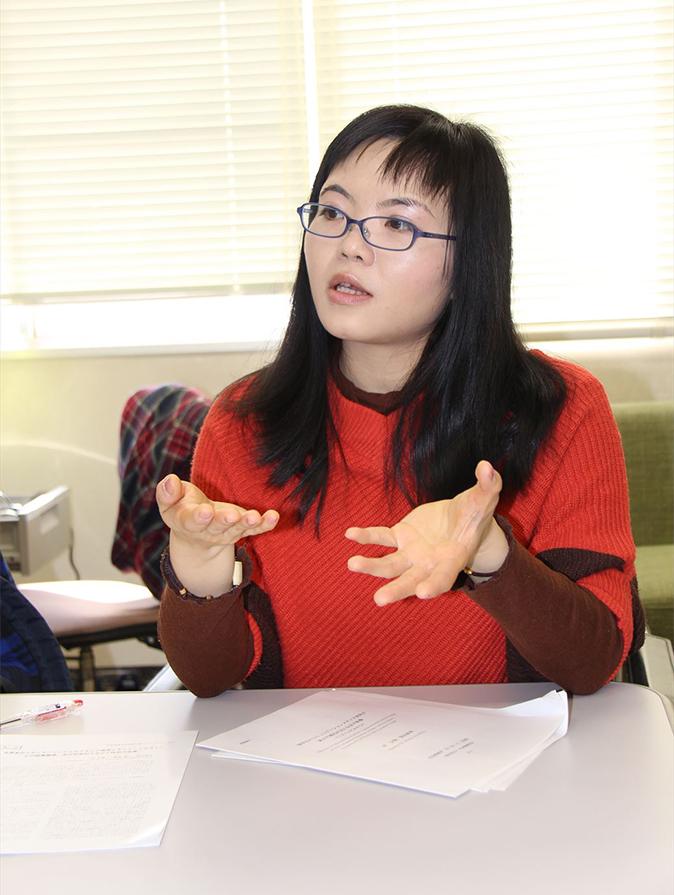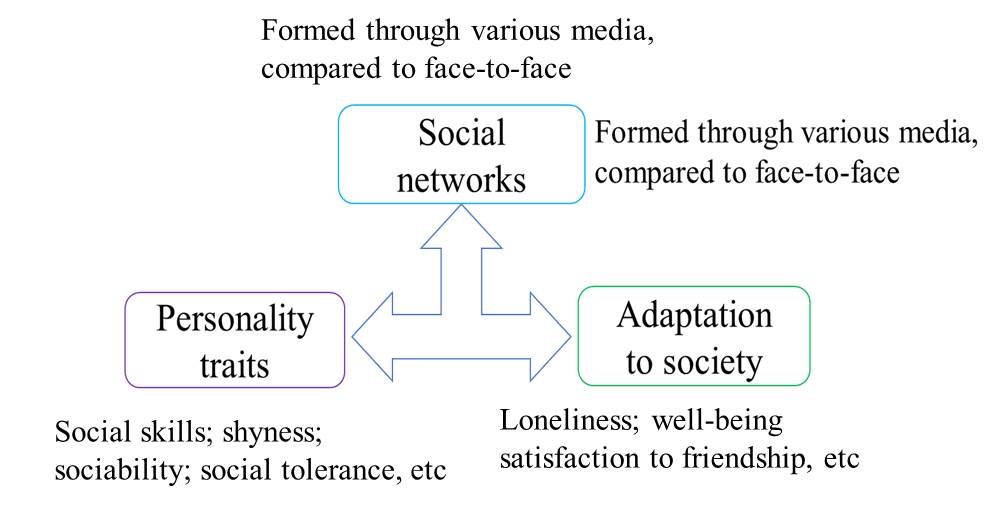TSUKUBA FUTURE
#072 Talking about Communication for the "Digital Native" Generation
Assistant Professor YE Shaoyu, Faculty of Library, Information and Media Science

From an early age the "digital native" generation takes the use of personal computers and mobile phones for granted in their daily lives. Today's university students are the first generation of digital natives. Usage of those devices has considerable effects on this generation's communication style. Professor Ye is seeking out the characteristics that can be found among this digital native generation in order to offer suggestions about how to promote interpersonal and intercultural communication.
In this modern world, there are few who do not use email or social media. Services such as Line, Facebook, and Twitter are widely used as means of communicating with friends. Using these services allows us to easily and instantaneously interact with large numbers of people. The theme of Prof. Ye's research is to shed light on how these digital native students, who have been used to such devices and media since childhood, use the various communication tools available to them, and how their interpersonal communication is conducted through those tools.
The University of Tsukuba is characterized by its large number of international students. With that in mind, Prof. Ye conducted surveys targeting Japanese students and international students at the university about their respective ways of communicating. She found that international students, regardless of nationality, made use of both voice calls and text messages along with face-to-face interactions. In contrast to that, she found that the Japanese students seldom made voice calls. In addition, while the Japanese language was preferred in most face-to-face communication between Japanese students and international students, when it came to text messages, foreign language such as English was used more often. This can partially attributed to the fact that although a Japanese student may lack confidence in speaking English, they are able to spend more time to compose a written message, which lowers the hurdles they face for communicating in English.
Surprisingly, Prof. Ye found that the largest factor that influences Japanese students' motivation for intercultural communication is not language ability or experience studying abroad, but their social tolerance instead. International students who study in Japan have had an interest in Japan from the beginning, and have a desire to become friends with Japanese people. With that assumption in place, the interactions proceed from the position that the Japanese students will find it easier to become tolerant towards them. However, they are hesitant in actively initiating approaches themselves. In this sense, international students who want to learn the Japanese language and better understand the Japanese culture might need to proactively create opportunities to engage in direct communication with Japanese students.
 In fact, her research from multicultural perspectives is based on her own past experience.
In fact, her research from multicultural perspectives is based on her own past experience.There are also differences in communication styles between males and females. In general, females can be considered to be more skillful at communications, whereas males tend to avoid self-disclosure such as confiding their problems or asking for help. This is the same both in person and online, and it is universal--not only among Japanese people. Prof. Ye also examined the causal relationships between the following three variables: the use of social media such as Facebook, social skills such as those involved in personal relationships, and Internet literacy including protection of privacy and judging the authenticity of information. She found that for male students, their social skills had no relationship with their frequency of posts on Facebook; while for female students, there was no cause and effect relationship between social skills and Internet literacy. This indicates that male students may tend not to transmit information, including self-disclosure, despite paying attention to other people. It furthermore indicates that female students may tend not to pay enough attention to the way they handle various types of information even when they have a higher level of social skills. Based on these results, Prof. Ye has proposed guidelines for an effective program on information and communication technologies in education.
 Conceptual diagram of the relationship details that Prof. Ye is focusing on in her research
Conceptual diagram of the relationship details that Prof. Ye is focusing on in her researchAlthough new communication devices make it easier to transmit information, this also opens up the higher possibility of becoming dependent on such devices. According to Prof. Ye's research, "shy but sociable" people have a greater tendency to depend on smartphones. "Shy but sociable" refers to individuals who have a strong motivation to be with others, while also realizing that they are fearful and inhibited about mixing socially. These individuals find it easy to immerse themselves in social media that allows them to connect with large numbers of people without face-to-face interactions, and they cannot help but engage in constant online interactions so that they can maintain the feeling of having many friends. For those with a serious dependence, they even send online messages to people who are standing right in front of them. While no effective countermeasures have been found yet, it is evident that for future digital native generations, education from an early age about how to use communication devices is indispensable.
The starting point for Prof. Ye's research was the question of how mass media influences audience's impression formations. Over the course of the last decade, there have been huge changes in telecommunications and environments, which has led her research themes and targets to successively change. These changes in the communication environment and technologies will most likely accelerate, which is not a bad thing in itself. However, no matter how much technology progresses, face-to-face communication will remain most important. The distinctions between the spoken word and the written word, as well as nonverbal information such as facial expressions and gestures, function to bring about rich mutual communications and reduce misunderstandings. As practical applications of new technologies continue to advance, Prof. Ye's inquiry into communication that can build fruitful interpersonal relationships will continue.
Article by Science Communicator at the Office of Public Relations


